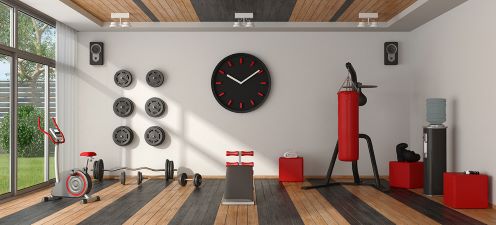Apps have changed the way consumers do just about everything: shop, date, consume audio and video, even exercise. The latter has led to a steady stream of people ditching their gym memberships for an app-based exercise regime at home. Treadmills, elliptical machines, weight benches and yoga mats are turning basements, dens, garages and other spaces into legitimate home gyms.
This trend presents ample opportunity for home systems integrators to incorporate technologies that can help fitness enthusiasts work out more efficiently and enjoyably at home.
According to a study by Sonos, music has some very powerful qualities when it comes to breaking a sweat.
A global survey of 12,000 people across 12 countries found listening to music is the key to reducing stress, improving productivity, feeling more connected to one another and being healthier.
Read Next: See How a Home Theater Morphs Into a Golf Simulation Room
In fact, 75% of people who exercise regularly say music has made a bigger impact on their fitness than any supplement.
Meanwhile, 81% say listening to great music inspires them to achieve greatness in their fitness, and 77% say if they’re thinking about skipping a workout, music can help them get started.
Sonos Survey Shows Sound Quality Matters When Exercising
To learn more about the influence listening and sound quality has on fitness specifically, Sonos conducted a three-day field study at PROJECT by Equinox in Manhattan.
It included 35 participants and measured the impact of sound quality on performance during High-Intensity Interval Training (HIIT) workouts.
Here are some findings that may impress clients who like to exercise at home:
- In high-quality sound conditions, participants increased their output by over 2% more than low-quality and 4% over no sound
- The average heart rate for the session was at its greatest during the high-quality intervals—almost 3.5% higher than during low-quality sound
- In high-quality sound, participants were able to push themselves harder without feeling like they were working out harder
- When compared to low-quality sound, participants felt a 34% increase in feelings of connection to workout partners during the high-quality sound session
“The effects and impact of music in sport, activity and exercise has been a research topic for well over 40 years, but for the first time, we’ve started to uncover the importance of sound quality (not just volume, tempo, and musicality) in helping athletes and fitness enthusiasts of all levels perform their best,” says Dr. Tom Brownlee, a lecturer in sport and exercise physiology.
“In a world where we spend thousands of dollars and hours researching gear and equipment that will give us any competitive edge, it’s interesting to discover that higher-quality sound seems to offer the kind of extra benefit we look for from a range of wearable training devices and accessories.”






